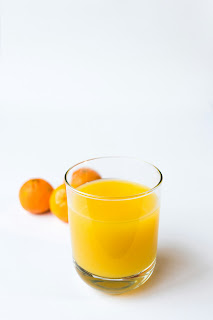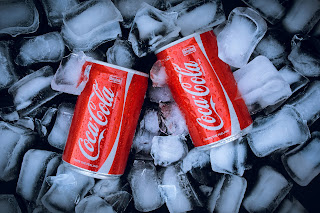Is orange juice worse than Coca Cola?
In this clip, Dr Spector says he'd rather people drink coca cola instead of orange juice, as orange juice is misleadingly sold as a health food, whereas cola isn’t. He says that we shouldn’t be drinking orange juice and he mentions the dangers of glucose spikes and inflammation.
I thought I needed to make a post and clear this up.
Is the sugar in orange juice the same as in Coca Cola?
Short answer: no.
Long answer: absolutely not.
Now let me explain.
The sugar in orange juice is naturally occurring sugar from within the fruit. All fruits contain sugar. Yes, when the orange is juiced it becomes a sugary drink. But this doesn't make it the same as a can of coke.
Oranges contain lots of vitamins and minerals that are crucial for our health.
And a 150ml serving of orange juice contributes to 1 of your 5 portions of
fruit and veg a day. It will contain
~13g of sugar, but it also has 53% of your daily vitamin C requirements, and
15% of your daily potassium requirements for a start.
Coca cola contains added sugar, in the form of sucrose. This
is added for the taste and to balance out the acidity. The daily recommendation for added sugars is
no more than 30g a day. A 330ml can of original Coca Cola contains 35g of
sugar. We know from countless research studies that excessively consuming added
sugars can increase the risk of overweight/obesity, tooth decay, and other
diseases.
We know that Coca cola is high in sugar and something to be drank occasionally. We also know that orange juice contains sugar, in addition to vitamins, and minerals. I'm not saying to go wild and drinks litres of the orange stuff every day, but it's not a fair comparison to coke.
I want to touch on some of the language used by Dr Spector. Orange juice isn’t ‘naughty’ and to be honest, neither is coca cola. Food isn’t naughty or nice, it’s just food. There’s no need to label foods and demonise them. It brings us no benefit and stops us having a positive relationship with food.
A little note on food processing:
It's also worth considering the fact that orange juice is
not an ultra-processed food, while coca cola is. Although Dr Spector seems to
think otherwise.
Food processing simply means that something has been done to
that food ingredient. This could be freezing, drying, or pickling. It can also
mean that the food has had things added to it like colouring, flavouring and
preservatives to change the form, texture, or shelf life.
Orange juice is classed as a minimally processed food as the only process that's been done to it is the juicing of the orange. For ultra-processed foods there isn't a universal definition. But it's typically a food that's had multiple industrial processes done to it, with equipment you wouldn't typically have in your home kitchen, and it doesn't resemble its original form.
Coca cola is an ultra-processed food. Other examples of ultra
processed foods include chocolate, chicken nuggets, and sweets.
We know from extensive research that consuming large amounts
of ultra-processed foods can increase the risk of type 2 diabetes,
cardiovascular disease, and strokes.
So, it's not really true to say that orange juice is worse than
cola, is it?
Will glucose spikes lead to diabetes?
Dr Spector also mentioned the latest buzzword of ‘sugar
spikes’. It seems to be the hottest trend at the moment to keep a close eye on
your blood sugar levels and supr ess your sugar spikes.
I firstly want to say, that unless you have a form of
diabetes, there isn't a need to worry about your blood glucose levels. Of
course, trying to maintain a healthy balanced diet is important, but you don't
have to worry about everything you eat.
Our blood sugar levels are supposed to rise after we eat/drink
something containing carbohydrates, it's completely normal for this to happen,
and if it didn't it means something is not working right!
When your blood sugar levels rise, we have the hormone
insulin which helps to bring it back down again. Again, this is completely
normal and is expected to happen. Dr Spector then goes on to say that blood
sugar spikes every 2 hours will lead to inflammation and type 2 diabetes.
I’m not quite sure how we took the leap from orange juice to
type 2 diabetes but let me just say that type 2 diabetes is not caused by
drinking fruit juice. It’s primarily caused by insulin resistance, which is
where your body doesn’t respond well to insulin and so your blood sugar levels
don’t go back down as normal. I also don’t know how a glass of orange juice
will lead to these two hourly glucose spikes unless, of course, you have a have
a glass every 2 hours.
Dr Spector also mentions generic ‘inflammation’ caused by
the sugar spikes. And it’s true that a diet high in processed sugars and
refined carbohydrates can promote inflammation, but I’m still not sure how we
reached this conclusion from orange juice.
There are also many things that can contribute to increased
inflammatory in the body like sleep deprivation, exposure to road traffic, or
being obese. But it’s orange juice Dr Spector wants to argue against? I’m not
convinced his message is one to promote.
Orange juice is not worse than cola and it’s very misleading
to say that it is. You can enjoy your 150ml glass of orange juice in peace.
I hope this post clears up any misconceptions about orange
juice and cola. I’d love to hear thoughts in the comments below.
Bye for now 👋
References:
https://www.fao.org/3/ca5644en/ca5644en.pdf
https://www.niddk.nih.gov/health-information/diabetes/overview/symptoms-causes
https://www.ncbi.nlm.nih.gov/pmc/articles/PMC5516328/
https://www.sciencedirect.com/science/article/abs/pii/S187140211930013X?via%3Dihub
https://pubmed.ncbi.nlm.nih.gov/32630022/
https://pubmed.ncbi.nlm.nih.gov/31142457/
https://pubmed.ncbi.nlm.nih.gov/29772560/



.png)

.jpg)

Thank you.
ReplyDeleteGlad you liked it!
Delete